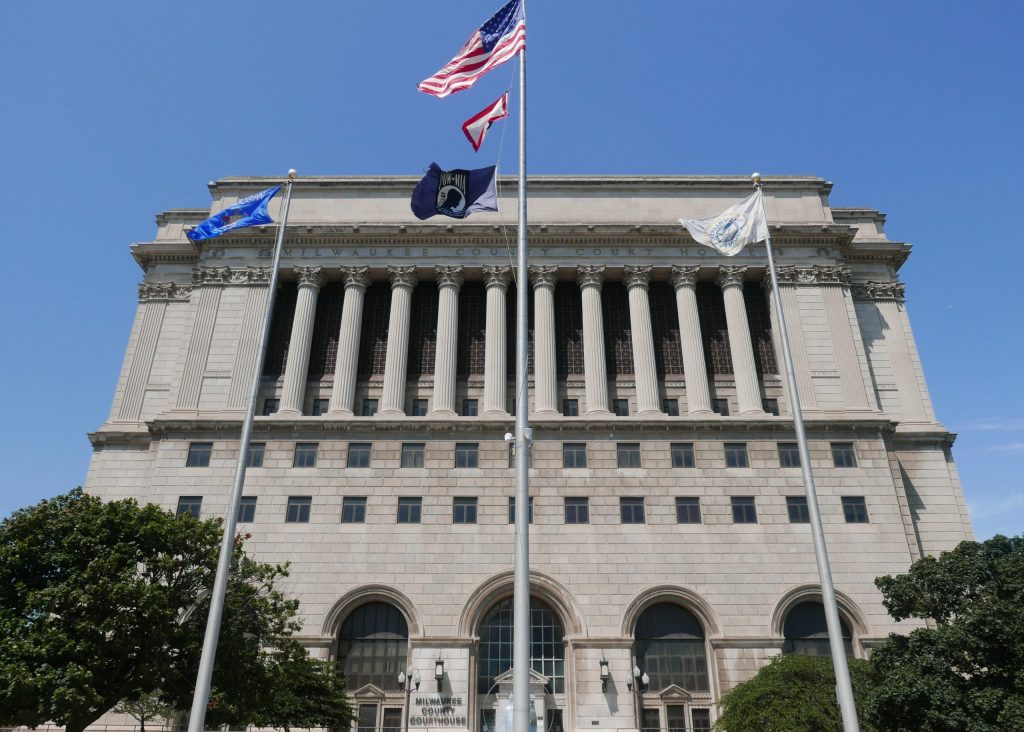Chief Judge, Sheriff At Odds On Bailiff Staffing
MCSO ends mandatory overtime in circuit courts, which threatens safety, Chief Judge says.

Milwaukee County Courthouse. Photo by Graham Kilmer.
Milwaukee County’s sheriff and top judge are at loggerheads over bailiff staffing in the courts.
The Milwaukee County Sheriff‘s Office (MCSO) has stopped forcing deputies to work overtime as bailiffs in the Milwaukee County Circuit Court System. In response, Milwaukee’s Chief Judge Carl Ashley is ordering Sheriff Denita Ball to maintain staffing levels in the courts, or risk affecting the safety and efficiency of the court system.
MCSO officials and the president of the Milwaukee Deputy Sheriff’s Association, Carlos Bruno, regularly say understaffing in the sheriff’s office is creating a crisis of morale. Deputies are forced to work overtime to meet the agency’s statutory responsibilities, including staffing the courts, the jail and patrolling the freeways. Sometimes deputies work seven days a week, according to the MCSO.
The agency is experiencing “unprecedented levels of overtime,” Chief Deputy Daniel Hughes wrote in an Aug. 23 memo to MCSO staff. The MCSO has lost more deputies in 2024 as of August than it did during all of 2023. The sheriff’s office has approximately 50 fewer deputies than were budgeted for this year. And even that isn’t enough to fulfill all of the sheriff’s duties without overtime, according to Hughes.
“It is not a matter of ‘if’ something bad will happen’ but ‘when’ will it happen,” Hughes said. “None of this even contemplates the havoc this is wreaking on our members’ health and well-being or the devastation of their family lives.”
The sheriff’s office is moving 15 deputies off other duties and assigning them to the courts, raising the number to 90, which is how many were budgeted for this year. Along with the shift, the agency is no longer forcing deputies working in the patrol or airport divisions to work overtime in the courts as bailiffs. The change will make maintaining operations in the courts “more challenging,” Hughes said, adding that the sheriff’s office will likely make staffing changes to other divisions in the near future.
The chief judge responded with a memo saying the proposed changes to the MCSO’s staffing policy would reduce the number of bailiffs available to the courts from two to one, slowing down court proceedings and lowering security. “It is unfortunately all too common to have violent behavior occur in our courtroom and hallways,” Ashley wrote.
On Sept. 6, Ashley issued a court order to the MCSO requiring the agency to provide at least two bailiffs per felony courtroom, maintain current staffing levels in the children’s courts and staff other court operations as needed.
The chief judge pointed to state legislation requiring the MCSO to “attend upon the court” and a Wisconsin Supreme Court ruling recommending at least two bailiffs per court. The chief judge laid out the statutory and constitutional powers granted to both the sheriff and the courts and determined that the sheriff “does not have unfettered discretion” and that courts have the authority to demand bailiffs.
“In light of the sheriff’s constitutional and statutory obligation to ‘attend upon the courts,’ a court has ample power to require the attendance of as many bailiffs as may be reasonably necessary for the fair administration of justice,” Ashley wrote in his order. “Unfortunately, the fair administration of justice is threatened by various bailiff-staffing concerns, as articulated in the recent inter-agency communication issued by Chief Deputy Sheriff Daniel Hughes.”
The courts need two bailiffs to avoid a slowdown of court proceedings, which can create backlogs of cases like those the system experienced during the COVID-19 pandemic. With two bailiffs, court proceedings do not need to stop when a person in custody or the jury is brought into the courtroom.
Also, the staffing must be maintained to ensure the community can safely participate in the judicial process and that jurors are adequately protected, Ashley said.
“It would be tragic to experience harm to court users or staff when we were aware of the potential dangers,” the chief judge said in his memo.
In response, the MCSO released a statement explaining that it would stick with its new policy of not forcing deputies to work overtime in the court, but it will allow them to volunteer for overtime. The point of the policy is to give sheriff’s deputies a break and “to stem the exodus of deputies who, worked to the point of both mental and physical exhaustion, are resigning for law enforcement jobs in other jurisdictions, and in some cases, leaving the vocation altogether,” Hughes said.
Staffing Shake-Up Occurs As Budget Season Begins
The MCSO lays the blame for the staffing crisis on county policymakers.
Even if the sheriff’s office was staffed at 100%, there would not be enough deputies to cover the “relief factor” needed for sick days and family and medical leave. Funding for new positions have been requested in the past and not provided, Hughes wrote in his August memo to MCSO staff.
“This situation we have been put in is not representative of having the healthiest county in Wisconsin, and it is certainly not healthy for our agency members,” Hughes said. “We are out of ‘creative’ or even ‘good’ options and have no other choices available to us, so now we must move on to choices that have drastic consequences.”
Departments across the county have had funding cut for more than a decade as the government’s revenue failed to keep pace with inflation and the annual cost of operating. The county has a $1 billion backlog of maintenance and infrastructure needs, with approximately half of that in the parks system. The Milwaukee County Transit System (MCTS) has been on the verge of major cuts for roughly the past five years and has only avoided them largely thanks to federal stimulus funding released during the COVID-19 pandemic. However, the transit system is not a constitutionally, or state mandated county service. The sheriff’s office is.
In 2023, the state legislature passed Wisconsin Act 12 establishing a new formula for funding local and county governments. The legislation also allowed the county to levy a new 0.4% sales tax and begin closing out its troubled pension system, enrolling new employees in the well-managed state system.
The additional sales tax revenue gave county policymakers the first budget surplus in more than a decade in 2024. It also significantly reduced the annual budget deficits that are projected to return next year. The 2024 budget also included pay raises for corrections officers working in the county jail and the Community Reintegration Center (CRC) to address the turnover and understaffing in the facility. Policymakers head into budget season with a projected $11.5 million budget deficit they will need to close in 2025.
“We know that this has been a problem for many years as it relates to making sure that we have the funds to invest back into the services that are mandated, quite frankly, at the state level,” County Executive David Crowley told Urban Milwaukee when asked about the MCSO’s new staffing policy in the courts. “But, I will say, I think this speaks directly to the fact that we need more dollars.”
Crowley’s office is working on how to respond to the situation in the upcoming budget, Crowley said, adding that he hopes his office can work with the sherifff’s office to “chart a path forward.”
“I don’t have any control over the sheriff’s office: what they do, how they schedule,” Crowley said. “But I do think that it’s important for the sheriff’s office to work with, not only the chief judge, but also work with the county executive’s office to make sure that we’re not only staffing, but how are we also being prudent with our tax dollars.”
Read the chief judge’s memo to the MCSO and his judicial order on Urban Milwaukee.
Legislation Link - Urban Milwaukee members see direct links to legislation mentioned in this article. Join today
If you think stories like this are important, become a member of Urban Milwaukee and help support real, independent journalism. Plus you get some cool added benefits.
Related Legislation: Documents related to MCSO bailiff staffing policy
Political Contributions Tracker
Displaying political contributions between people mentioned in this story. Learn more.
MKE County
-
County Gets $1.5 Million for Urban Forestry
 Sep 9th, 2024 by Graham Kilmer
Sep 9th, 2024 by Graham Kilmer
-
County Strings Together Funds to Close $19 Million 2024 Budget Deficit
 Sep 6th, 2024 by Graham Kilmer
Sep 6th, 2024 by Graham Kilmer
-
Despite Low Offer, MCTS Loses Bid To Run Waukesha Bus System
 Sep 6th, 2024 by Graham Kilmer
Sep 6th, 2024 by Graham Kilmer





















